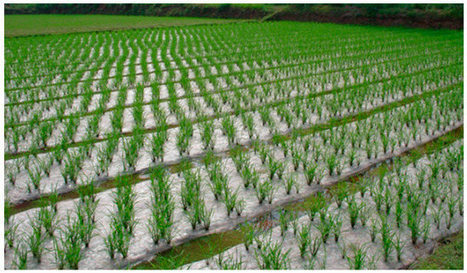China has attained rice sufficiency with the increased use of nitrogen (N) fertilizer, but this has led to serious N pollution. Using plastic film on raised-beds, combined with improved agronomic practices, can boost rice yield by 50% with 36% less N fertilizer use, 30% higher NUE, and stabilized the yield of 9.75 t ha−1. It also counters the effects of drought and low ambient temperature. A six-year study was conducted combining no-tillage, crop-residue mulch, and plastic cover, alternating organic rice and rapeseed production. The plastic cover integrated technology (PCIT) reported on here combines the use of plastic film to cover the raised beds with improved agronomic practices from the System of Rice Intensification (SRI). All the treatments, fertilized with biogas slurry and rapeseed meal, gave rice yields of 7.0 to 10.7 t ha−1, well above China’s average of 6.5 t ha−1. In this time, soil organic matter increased from 1.6% to 4.2%. In the first four years, the combination of crop-residue mulch with plastic cover had a slightly higher yield than mulch alone. In the fifth and sixth years, the latter treatment surpassed the use of plastic cover with crop-residue mulch. Trials with a biodegradable film show that plastic pollution can be dealt with.
Research and publish the best content.
Get Started for FREE
Sign up with Facebook Sign up with X
I don't have a Facebook or a X account
Already have an account: Login
 Your new post is loading... Your new post is loading...
 Your new post is loading... Your new post is loading...
|
|











https://www.livestockanimalexchange.com/product/leicester-longwool-sheep-for-sale/
https://www.livestockanimalexchange.com/en/product/fleckvieh-cattle-for-sale/